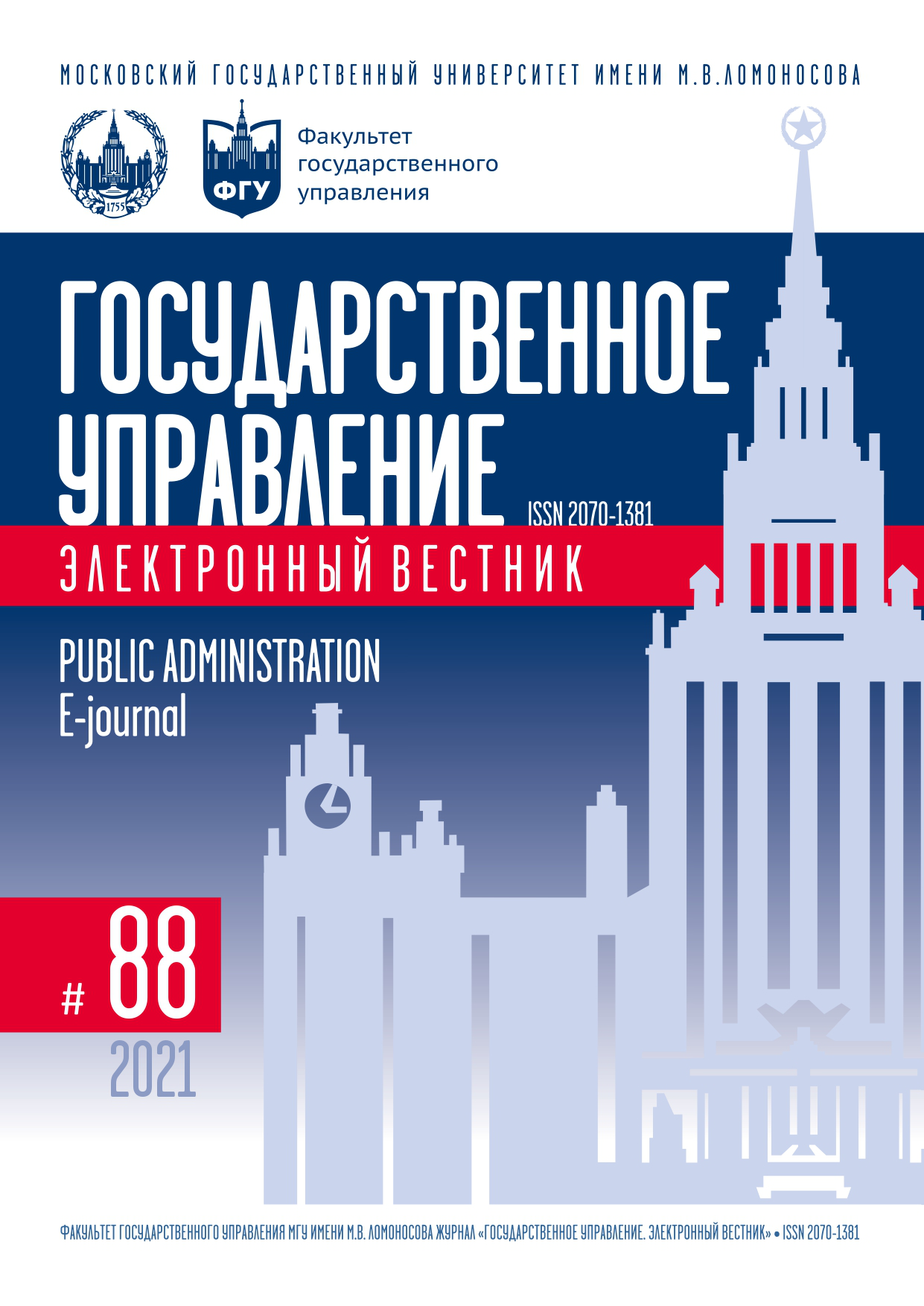Russian Monotowns: Factors of Socio-Political Conflicts Extension
Keywords:
Typology of conflicts, socio-political conflicts, increasing the efficiency of state policy, monotowns, state policy for the development of monotownsAbstract
The article is devoted to the factors of emergence and escalation of socio-political conflicts in modern Russian monotowns, the quality of life in which largely depends on the quality of functioning of the city-forming enterprises. In monotowns, a unique management situation has historically developed, when a city-forming enterprise contains urban social infrastructure facilities, it is responsible for their condition to all groups of the city’s population, regardless of their employment or unemployment at this enterprise. The authors propose their own typology of factors of socio-political conflicts, represented by some groups (economic, specificity of the political regional process, social well-being of residents in single-industry towns, a model of interaction between counterparties and features of state policy for the development of monotowns) as well as recommendations for solving the problems of monotowns development, which are associated with the creation of a more balanced model of interaction between local, regional authorities and the federal political and managerial elite for the development of monotowns with a mandatory increase in the financial and administrative capabilities of local elites and at the same time fixing federal/regional financial assistance to monotowns cities for implementing social obligations in case of local budgets deficit, expanding the interaction of all counterparties of monotowns in solving specific problems of a particular settlement, increasing the effectiveness of state policy for the development of monotowns by optimizing the political, administrative, institutional, financial blocks, adjusting youth and educational state policies, and generally optimizing the employment policy in this type of Russian territorial units.
References
Аксянова А.В., Чехломин С.В. Методы оценки экономической привлекательности моногородов для населения // Вестник Кемеровского государственного университета. Серия: Политические, социологические и экономические науки. 2018. № 2. С. 52–58. DOI: https://doi.org/10.21603/2500-3372-2018-2-52-58.
Андрюшина Е.В., Панова Е.А., Опарина Н.Н. Состояние трудовых ресурсов в Дальневосточном федеральном округе. М.: АРГАМАК-МЕДИА, 2017.
Бельчик Т.А., Якушина Т.А. Влияние градообразующего предприятия на диверсификацию рынка труда моногорода // Вестник Кемеровского государственного университета. Серия: Политические, социологические и экономические науки. 2018. № 2. С. 59–65. DOI: https://doi.org/10.21603/2500-3372-2018-2-59-65.
Богданова И.Н., Кадырова Х.Р. Проблема миграции молодежи моногородов и пути ее решения // Высшее образование в России. 2015. № 5. С. 161–163.
Зубаревич Н.В. Трансформация рынков труда российских моногородов // Вестник Московского университета. Серия 5. География. 2017. № 4. С. 38–44.
Иванов О.Б. Социальные конфликты и политический протест в России последних лет // Политика и Общество. 2019. № 6. С. 1–14. DOI: 10.7256/2454-0684.2019.6.28606.
Иванова Л.Л. Обеспечение кадровой безопасности в современной России: опыт моногородов // Государственное и муниципальное управление. Ученые записки. 2018. № 1. С. 132–138.
Лапушинская Г.К. Особенности государственного регулирования занятости населения моногородов // Вестник ТвГУ. Серия «Экономика и управление». 2015. № 4. С. 113–123.
Меерович М.Г. Советские моногорода: история возникновения и специфика // Вестник Кемеровского государственного университета. 2018. № 1. С. 53–65. DOI: https://doi.org/10.21603/2078-8975-2018-1-53-65.
Мосиенко Н.Л., Черепанова А.А. Жизненные стратегии жителей моногорода: привлекательность места жительства и миграционные установки // Вестник Кемеровского государственного университета. Серия: Политические, социологические и экономические науки. 2018. № 1. С. 34–41. DOI: https://doi.org/10.21603/2500-3372-2018-1-34-41.
Прошанов С.Л. Социальный конфликт в трудах российских социологов начала XX века (1910–1914) // Социологические исследования. 2007. № 12. С. 115–120.
Пятшева Е.Н. Особенности функционирования моногородов России // Вестник РГГУ. Серия «Экономика. Управление. Право». 2019. № 2. С. 18–34. DOI: 10.28995/2073-6304-2019-2-18-34.
Ревенко Н.Ф., Чикурова О.В., Силиванова О.А. Влияние градообразующего вуза на демографическую ситуацию в моногороде // Вестник ИжГТУ имени М.Т. Калашникова. 2017. Т. 20. № 3. С. 80–85. DOI: 10.22213/2413-1172-2017-3-80-85.
Романенко К.Р., Шибанова Е.Ю., Абалмасова Е.С., Егоров А.А. Высшее образование в моногородах: организационные форматы, практики, вызовы // Университетское управление: практика и анализ. 2018. Т. 22. № 4. С. 110–125. DOI: 10.15826/umpa.2018.04.044.
Самарин А.Н. Социальные конфликты в меняющемся обществе // Социологические исследования. 1997. № 2. С. 145–149.
Урбан О.А. Набор в вузы как фактор кадровых рисков модернизации моногородов Кузбасса // Социологические исследования. 2018. № 3(407). С. 53–61. DOI: 10.7868/S0132162518030054.
Шаститко А.Е., Фатихова А.Ф. Моногорода России: возможные варианты развития // Государственное управление. Электронный вестник. 2019. № 76. С. 109–135. DOI: 10.24411/2070-1381-2019-10006.
Crawford C.E. From Tractors to Territory: Socialist Urbanization through Standardization // Journal of Urban History. 2018. Vol. 44. Is. 1. Р. 54–77. DOI: https://doi.org/10.1177/0096144217710233.
Crowley S. Monotowns and the Political Economy of Industrial Restructuring in Russia // Post-Soviet Affairs. 2016. Vol. 32. Is. 5. Р. 397–422. DOI: https://doi.org/10.1080/1060586X.2015.1054103.
Mack R.W., Snyder R.C. The Analysis of Social Conflict: Toward an Overview and Synthesis // Conflict Resolution. 1957. Vol. 1. No. 2. Р. 212–248.
Oberschall A. Theories of Social Conflicts // Annual Review of Sociology. 1978. Vol. 4. P. 291–315.

